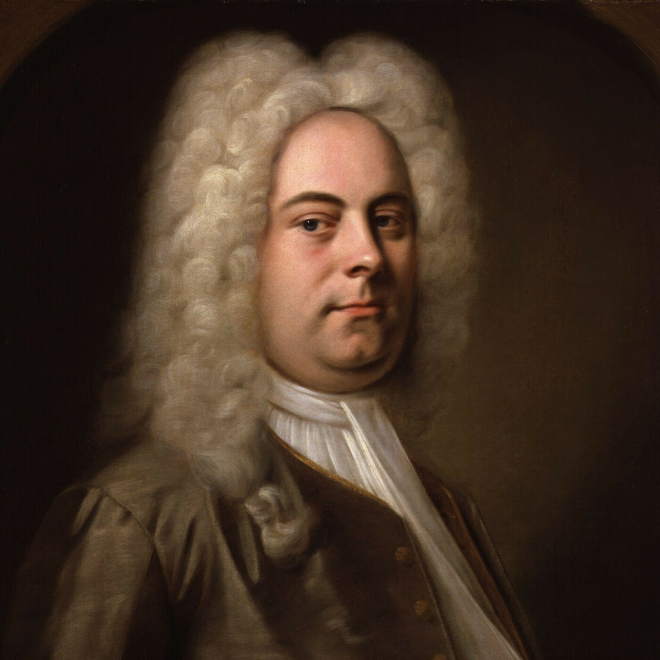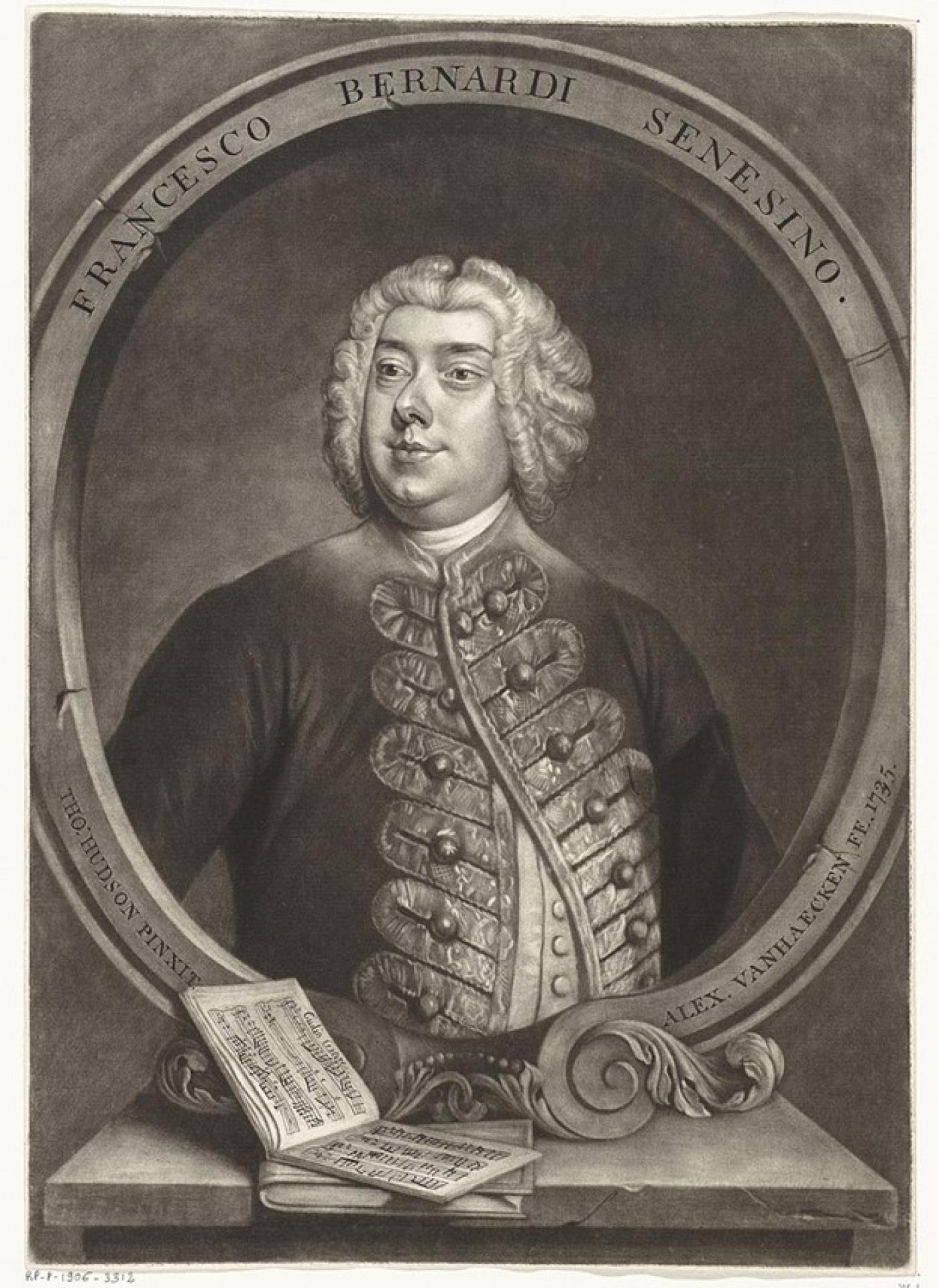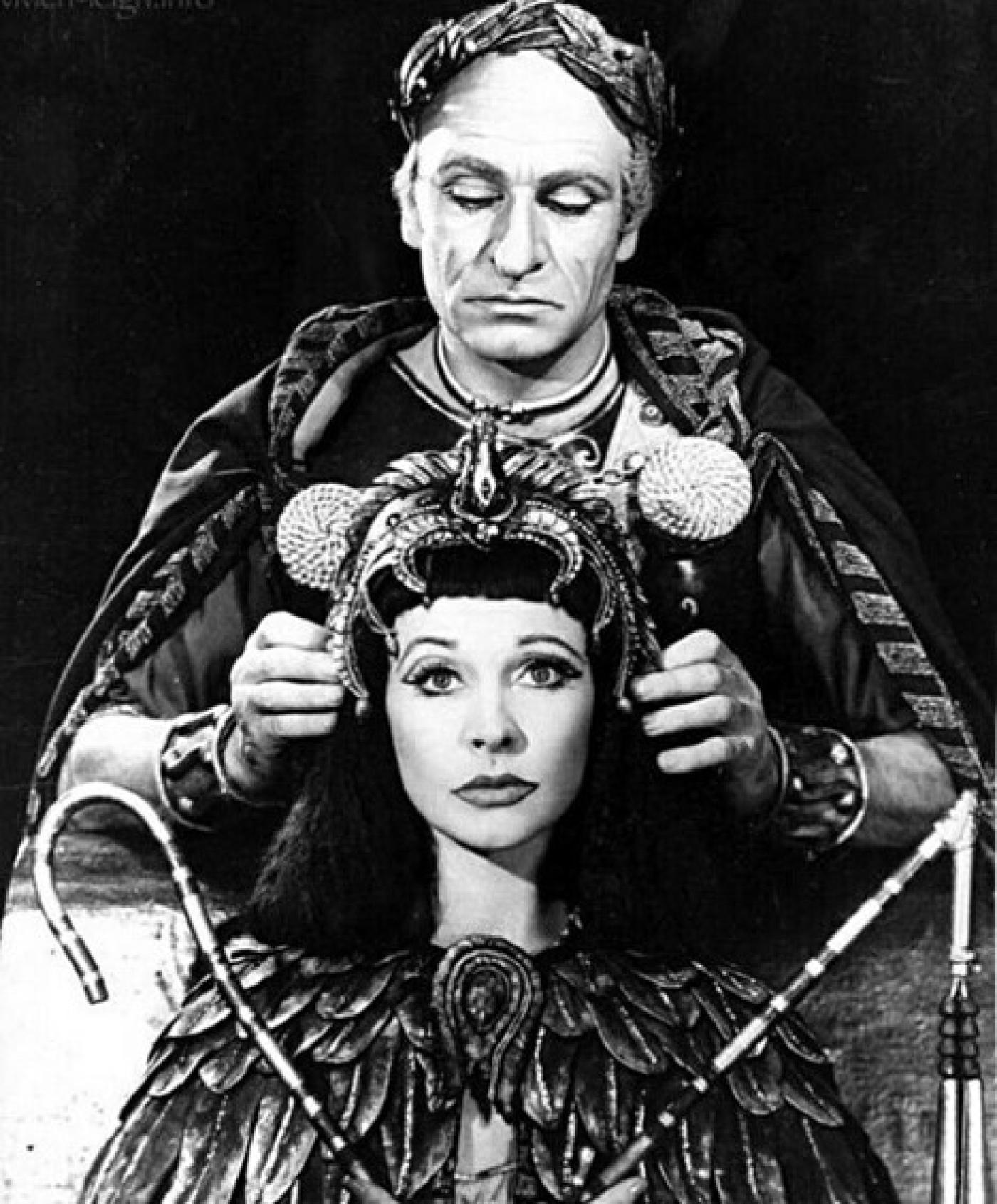Editor's Note: You can enjoy Handel's Giulio Cesare in Egitto on WETA VivaLaVoce's Opera at 8 on February 20.
This year marks the 300th anniversary of the world premiere of George Frideric Handel’s Giulio Cesare in Egitto, which took place on February 20, 1724 in London at the King's Theatre in Haymarket. This was Handel’s tenth opera to receive its premiere in this venue since his London opera career began with Rinaldo in 1711. (The theatre was originally built in 1705, was destroyed and replaced three times on the same site and on the same foundation, and is currently known as His Majesty’s Theatre, where The Phantom of the Opera has been playing since 1986.) These days the work is usually known simply as Giulio Cesare, but the two additional words in the original title - in Egitto, in Egypt - are important, because this isn't the same story we encounter in Shakespeare’s Julius Caesar, whose play of that name is about the famous assassination on the Ides of March in 44 BC. Handel’s opera takes place four years earlier, when Caesar took the Roman civil war to Egypt in pursuit of his rival Pompey, and in so doing ended up arbitrating Egypt’s own civil war between siblings/spouses/co-regents Ptolemy XIII and Cleopatra VII, and having a romantic affair with the latter.
But before I start encouraging my fellow men to think about the Roman Empire even more than we apparently already are, let’s talk about the opera.
This premiere we’re celebrating took place three days before Handel’s 39th birthday. He was at his personal and professional peak, and Giulio Cesare was an instant success. According to a letter dated March 10, 1724, “the house was just as full at the seventh performance as at the first.” Before the end of the year it was performed in Paris, where it was rapturously received, and a “Pocket Companion for Gentlemen and Ladies” was published containing the sheet music, lyrics and English translations of ten of the opera’s arias, which sold so well that a second edition was also produced that same year. The following year it premiered in Germany, where it also proved to be immensely popular, and enjoyed a second season in London. It continued to be widely performed in England and Germany for another decade; when the rather curious mania for Italian-language opera in non-Italian countries finally died out in the late 1730s, Giulio Cesare, like the rest of Handel’s operas, lay forgotten until the twentieth century.
You may well wonder how Italian opera became popular enough in England to sustain Handel’s career for three decades and make him a rich man. (Indeed, a lot of people in London at the time wondered the same thing; there is a treasure trove of documented snark concerning opera penned by witty Baroque Englishmen. One of the few stage works more successful than Giulio Cesare in 1720s London was The Beggar’s Opera, a devastatingly effective parody of operatic conventions, corrupt politicians, and hypocrisy in all its forms; its tremendous success helped accelerate the demise of Handel’s company and the development of modern musical theatre.) One reason is that these operas were star vehicles for Italian singers possessing extraordinary ability and near-mythic personas who were paid fortunes to travel to England to perform; another is that these were the superhero movies of their time, with quasi-cinematic stagecraft and exciting (if not always coherent) stories drawn from mythology and ancient history. When one considers the resources required to perform Giulio Cesare, its success is even more impressive, since its budget was eye-popping, requiring eight imported star singers including three of the most expensive kind, castrati (more on those in moment); an orchestra of 40-50 instrumentalists, including nine onstage musicians dressed as divine Muses; settings including a sumptuous Egyptian palace, the banks of the Nile, and a room in a tower with a window that Caesar dives out of into the Nile; a full-fledged onstage battle scene between the two Egyptian armies; two swordfights ending in death; and a severed head that has to be realistic enough to inspire horror and explosive emotional reactions from several characters. We have to assume that, like today’s nine-figure blockbusters, the investment pays off when people line up for the spectacle. (The one evident cost-cutting measure Handel employed was to forgo hiring a chorus even when the score and libretto call for one, so that the soloists had to sing the choruses as an ensemble, which often makes no dramatic sense – but then no one is here for the logic.)
About the castrati: they were men surgically altered to maintain their pre-pubescent treble voices, so that they sang in the same vocal range as women. Today these roles are taken either by men who have trained themselves to have mastery and depth in their falsetto range, or by women who find ways to project maleness while singing in their normal range. Neither is a completely satisfactory substitute, since contemporary descriptions of the castrato voice depict a unique timbre and vocal power distinct from either women or male falsettists (aka countertenors). When Handel’s operas began to be revived a century ago the common practice was to transcribe Handel’s castrato roles down an octave and sung by tenors or baritones. But these roles really are written with the higher ranges in mind, especially when they get virtuosic, and they’re designed to blend with the orchestra in a specific way. We have several examples of Handel himself rewriting a castrato role for a regular male voice, and when he does so he almost always writes new music instead of making a transcription. Therefore it has become standard practice in the last 30-40 years to adopt the imperfect solution of casting women or countertenors in castrato roles.
This is complicated even further by Handel’s occasional use of “travesti” or trouser roles, i.e. male character roles that Handel actually intended to have performed by women. This practice, like the use of castrati, is as old as opera itself, and continued to be used in operas such as Le nozze di Figaro and Der Rosenkavalier (not to mention the Broadway version of Peter Pan,) It is effective when depicting boys on the verge of puberty who have complex, emotionally demanding roles. As it happened Giulio Cesare contains just such a role: Sextus, the revenge-minded teenage son of Pompey. But, since the opera also contains roles for three castrati, it’s likely that a modern performance will contain more than one male role performed by a woman.
So when listening to Giulio Cesare as a purely audio experience, one has to carefully distinguish among three types of voices all singing in a high range: women playing women, women playing men, and men playing men using their falsetto voice. (There are also a couple of supporting roles in which men play men using their normal baritone range.) The most challenging role to cast is, unsurprisingly, the title role. Handel wrote this role for one of the most celebrated castrati of his day, Francesco Bernardi, known by the single name Senesino. The noted composer and flutist Johann Joachim Quantz described him as having a "a powerful, clear, equal and sweet contralto voice, with a perfect intonation and an excellent shake [trill]. His manner of singing was masterly and his elocution unrivalled. … he sang allegros with great fire, and marked rapid divisions, from the chest, in an articulate and pleasing manner. His countenance was well adapted to the stage, and his action was natural and noble. To these qualities he joined a majestic figure; but his aspect and deportment were more suited to the part of a hero than of a lover."
Reading this description is helpful in determining how to cast this role. Since falsetto is a head voice, it would be difficult for a countertenor to sound “from the chest.” Julius Caesar is both hero and lover in this opera, but since there’s a clear political agenda to his romantic escapades (and since the historical Caesar was about thirty years older than Cleopatra at the time the events of this opera took place) then his heroic aspect should definitely take precedence. Therefore it makes some sense that Caesar be played by a woman with a powerful voice and majestic composure, rather than by a man using thinner part of his voice. It also makes some dramatic sense that there is a casting parallel between Sextus and Caesar; all warriors are essentially children fighting to prove themselves, simultaneously precocious and perpetually adolescent.
The other two castrato roles, however, make some sense sung by countertenors. Ptolemy is not much older than Sextus but was born into immense privilege; he is not seeking justice but power for its own sake, as well as the settling of petty grievances that harm his fragile ego. He is neither hero nor lover but a small-minded tyrant and entitled brat. It fits his character to be portrayed by a countertenor, who can easily sound imperious but without gravitas. The third castrato role is Nireno, an elderly but loyal servant to the dysfunctional Egyptian royal couple who has seen it all; one could imagine that his voice reflects what Shakespeare called the sixth age of man, “the lean and slippered pantaloon,” “his big manly voice/Turning again toward childish treble, pipes/And whistles in his sound.”
This is indeed how the voices are cast in the recording we will be hearing on WETA VivaLaVoce: Caesar is sung by a woman contralto, Sextus by a woman soprano, and Ptolemy and Nireno by men singing falsetto. It should be noted that Handel’s singers were hardly great actors; they were known for being somewhat dense divas, which makes Handel’s accomplishement even more remarkable, since he had to basically do all the character work for them by making sure it’s all in the notes.
And now let’s get back to our Roman history:
The opera begins as the chorus hails Caesar for his victory over Pompey as his troops arrive on the banks of the Nile. Pompey’s wife Cornelia and son Sextus dutifully participate in the cheering, after which they petition Caesar to spare Pompey’s life. Caesar, who despite his rivalry with Pompey still respects him as a fellow Roman of great honor, agrees to spare him on the condition that he meets with him in person. No one expects what happens next: Achilla, the general of the Egyptian army, presents Caesar with the severed head of Pompey, a “present” from Ptolemy who assumes that Caesar would appreciate their support of Caesar’s side in the Roman war. Caesar is furious, Cornelia is overwhelmed with horror and grief, and the teenage Sextus becomes single-mindedly bent on revenge, while both Achilla and Caesar’s own general Curio indicate their designs on the newly widowed Cornelia. Ptolemy and Cleopatra realize that they have to do some serious damage control to placate Caesar while trying to turn him against the other. Ptolemy offers him hospitality in the royal palace while secretly plotting his betrayal (which Caesar fully expects), while Cleopatra dons a disguise and stages an elaborate seduction accompanied by a heavenly-sounding onstage orchestra. Ptolemy orders the capture of Cornelia, intending to force her into his harem; with the help of Nireno, Sextus sneaks into the palace with her, with the intention of killing Ptolemy. Having gotten wind of what Cleopatra is doing, he orders his soldiers to interrupt her second “date” with Caesar, who escapes by jumping out the window into the Nile, a leap that everyone assumes was fatal. Achilla confronts Ptolemy and accuses him of betrayal; he is stabbed for his efforts, but before he dies he gives Sextus his seal authorizing him to command his armies to rise up against Ptolemy, who has prevailed in a battle against Cleopatra’s army, and she is imprisoned. But then Caesar unexpectedly returns, takes the seal from Sextus to assert control over Egypt before paying a visit to Cleopatra. Meanwhile Sextus confronts Ptolemy as he’s about to rape Cornelia and kills him. Caesar escorts Cleopatra into Alexandria where he declares Cleopatra to be the queen of Egypt with the full support of Rome.
This tale is told mostly through the singing of thirty arias over the course of four hours (not including two intermissions.) It is a testament to Handel’s genius (and his faith in the talent and charisma of the cast he assembled) that he could create a compelling drama out of a series of arias – but what arias! Caesar and Cleopatra have eight arias each, and they have the cumulative effect of creating characters as deeply complex and recognizably human as those that Shakespeare created out of a series of monologues. Indeed, Handel’s version of Caesar is far richer than that found in Shakespeare’s play (which admittedly took place in a far darker and less active chapter of his life), while Handel’s Cleopatra is a worthy prequel to Shakespeare’s portrayal of her “infinite variety” in Antony and Cleopatra.
It’s also remarkable that Handel’s opera is more historically accurate than George Bernard Shaw’s 1898 play Caesar and Cleopatra that covers the same historical events. Shaw is known for his mastery of language and bracing intellect, and this play was one of his most popular, enjoying several successful Broadway runs featuring actors such as Laurence Olivier, John Gielgud and Rex Harrison as Caesar, and was made into a major motion picture in 1945 starring Claude Rains and Vivien Leigh. There’s just one problem: as smart as he was, Shaw seems to have been bad at math. The events took place in 48-47 BC, when Julius Caesar was 52 years old while Cleopatra, whose exact birthdate is unknown but it has long been established by scholars that she was born in late 70 or early 69 BC, would have been 21 -22. That’s certainly eyebrow-raising, but it’s hardly scandalous in a universe that includes an incestuous ruling couple. For some reason, Shaw depicts Cleopatra as a 16-year-old when she encounters Caesar, which is historically inaccurate and gratuitously salacious. While her age is never mentioned in the opera, she comes across as vivacious, moody and manipulative – literally a drama queen - but she’s definitely no teenager; she knows exactly what she’s doing and understands the stakes involved.
Baroque opera largely deserves its reputation as being absurd and wedded to a number of conventions that impede its ability to be dramatically compelling or musically satisfying beyond the fleeting pleasure of whatever aria is happening at any given moment. Giulio Cesare does not rebel against these conventions; structurally it’s actually one of Handel’s more conservative operas. But not only was it one of Handel’s most popular works in his own time, it was one of the first Baroque operas to enter the standard repertory in the 20th century, as if its reputation just took up where it left off around 1735. It turns out you don’t need radical innovations when you have a well-crafted libretto, a great composer who understood the power of the voice as well as any composer who ever lived, and colorful historical figures who have been firing humanity’s collective imagination for over two millennia.
You owe it to yourself to devote four hours of your life to one of the greatest operas ever written. Please join our 300th anniversary celebration on WETA VivaLaVoce.
PBS PASSPORT
Stream tens of thousands of hours of your PBS and local favorites with WETA+ and PBS Passport whenever and wherever you want. Catch up on a single episode or binge-watch full seasons before they air on TV.


